#Burt Pugach
Explore tagged Tumblr posts
Text

Crazy Love (2007)
by Dan Klores and Fisher Stevens
1 note
·
View note
Text
The Crazy Love of Burt Pugach and Linda Riss
This is a show biz blog and Burt Pugach (1927-2020) had a modest footprint in show business. He was invested in New York nightclubs, and he produced the crime drama Death Over My Shoulder (1958) with Keefe Braselle, Bonar Colleano, and Jill Adams. But history will always remember him for something else, a memory amplified by the 2007 documentary Crazy Love, co-directed by Dan Klores and Fisher…
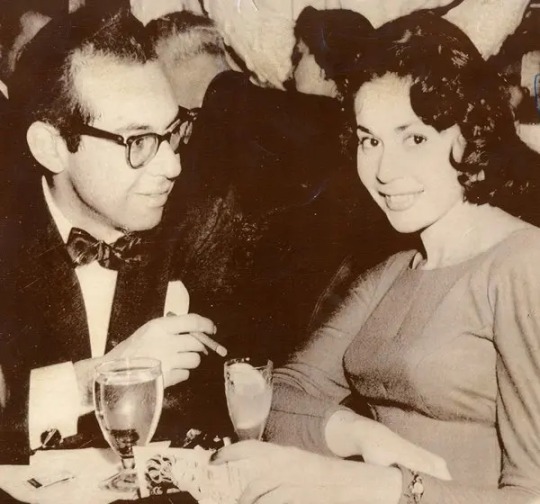
View On WordPress
1 note
·
View note
Link
TW:abuse
https://www.reddit.com/r/TrueCrimeDiscussion/comments/ir0g2i/true_crime_media_photo_of_linda_and_burt_pugach/
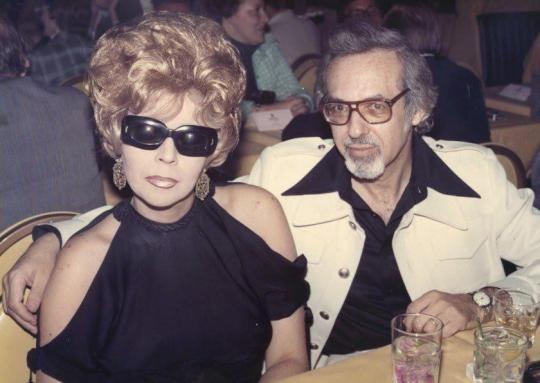
1 note
·
View note
Photo
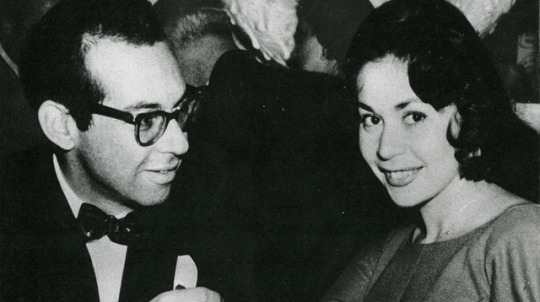
Burt Pugach and Linda Riss, 1957/58
0 notes
Text
Reseña y resumen de la película Crazy Love (2007)
Reseña y resumen de la película Crazy Love (2007)
Los franceses tienen un término para ello: amor loco, amor loco, amor obsesivo, el tipo de amor que tal vez no ama en absoluto, sino una especie de pasión que todo lo consume también, más poderosa que una adicción a los narcóticos. Esto parece ser lo que poseyó al abogado / playboy / Arnold Stang de 32 años, Burt Pugach, casi desde el momento en que vio a la hermosa Linda Riss, de 20 años, en el…
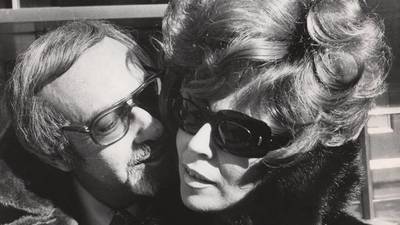
View On WordPress
0 notes
Text
Burt Pugach, Protagonist of a Strange Tabloid Love Story, Dies at 93
Burt Pugach, Protagonist of a Strange Tabloid Love Story, Dies at 93
In an incongruously serene finale to a half-century of making lurid headlines — he hired thugs to blind the lover who had spurned him, served 14 years in prison for arranging the assault, married her after he was released, cheated on her with a younger mistress and was forgiven yet again — Burt Pugach died inconspicuously four months ago in Queens. But as befits what he described as “a storybook…
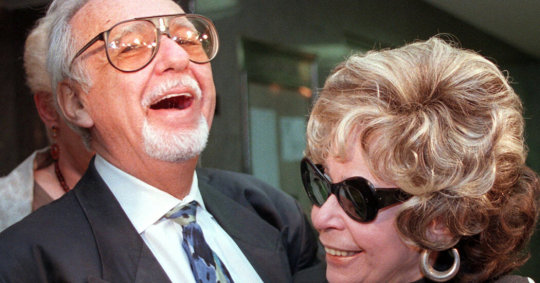
View On WordPress
0 notes
Text
0 notes
Photo
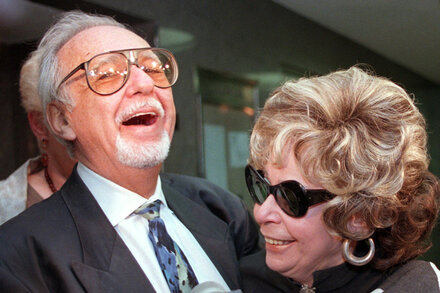
"Burt Pugach, Protagonist of a Strange Tabloid Love Story, Dies at 93" by BY SAM ROBERTS via NYT New York https://ift.tt/3e1bbEF
0 notes
Text
NYPD veteran gave wife his blessing to have an affair with dying Burt Pugach after coming out as gay
NYPD veteran gave wife his blessing to have an affair with dying Burt Pugach after coming out as gay
A embellished NYPD veteran whose spouse is accused of seducing and ravenous a infamous aged legal professional to dying to grab his $15m property claims he gave the fling his blessing, DailyMail.com can reveal. Ex-cop William Frawley reveals in new court docket papers that he had already come out as homosexual and began a relationship with a person earlier than his spouse Shamin began sleeping…
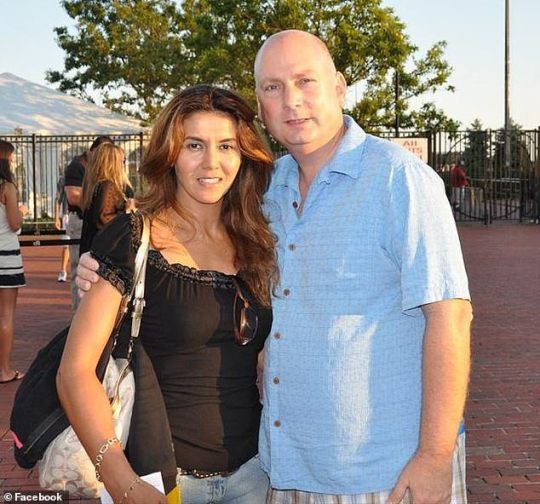
View On WordPress
0 notes
Text
Why Do We Fall in Love? Science Can Explain
New Post has been published on http://foursprout.com/health/why-do-we-fall-in-love-science-can-explain/
Why Do We Fall in Love? Science Can Explain
What’s the point of love? I’m not asking this to set myself up as the troubled lead in a rom-com who, after a series of montages, will eventually learn to open her heart and love again. I’m seriously asking: Why do we love? It must pose some evolutionary advantage, or love would have faded away with Cro-Magnon foreheads. But why on Earth would we evolve to be overwhelmed by an emotion that makes us act like Logan Paul in a Japanese forest, which is to say, a completely irrational idiot?
You might also like
displayTitle READ
Tina Turner isn’t the only one who’s been asking what love’s got to do with it. Scientists have devoted a good amount of time to figuring out the evolutionary point of love, and they’ve come up with a few interesting theories—all of which start with our big-ass heads.
Yes, it seems our oversize craniums are the nexus of love. I don’t mean that figuratively, like our huge egos send us on a quest for companionship. Nope: According to most bioanthroplogists today, our thick skulls literally changed our species and led to an evolutionary need. When humans started walking upright on two feet, the shape of our pelvis changed. And with that change, we had to give birth to smaller babies, or their heads would grow too big to pass through the birth canal. (Feeling amorous yet?)
Anyway, our little pelvises meant that babies had to be born before they could do basically anything. Ever see the birth of a baby deer? That thing’s frolicking all over the place straight out of the womb. Baby deer are almost fully developed immediately after birth. Conversely, human babies are utterly helpless and require a lot of time and care from their parents to live through this vulnerable stage and make it to sexual maturity; we do most of our growing outside the womb, a fact that has led to all kinds of benefits, but is tough on parents.
The fact that humans are born so early in their development led to two major developments: First, since babies grow so much outside of the womb, our brains can grow bigger than other mammals’. Second, the delicate life of a baby requires a lot of work, and the child is more likely to survive if it has two caretakers. According to an article in Perspectives on Psychological Science, love works as a “commitment device” to motivate pair bonding, and pair bonding helps humans with “the massive investment required to rear children.”
But although love seems to have initially developed as a “commitment device,” we’d recommend against scrawling, “I’m so in a commitment device with you” on your Valentine’s Day cards.
Still, pair bonding can’t explain everything about love. Thankfully, we can look to a similar species to learn more about our amorous behavior: prairie voles. When it comes to love, we aren’t closest to apes, chimps, or monkeys. Our behavior is most similar to prairie voles, which are basically chubby, short-eared field mice. Turns out these Laura Ingalls Wilderian mini mammals are one of the few animals that mate for life and raise babies in a two-parent home. That means we can learn a lot from these loving critters… especially when we take a little time to mess with their brain chemistry.
“You might be surprised how easily one can mimic ‘true love,'” says Don Vaughn, Ph.D., professor of neuroscience at Santa Clara University. The release of oxytocin and vasopressin are thought to be primarily responsible for the deep, attached feelings of romantic love. And when you block those hormones in prairie voles, “they become promiscuous almost immediately,” Vaughn says.
So, even the “til death do us part” prairie voles start incessantly swiping right as soon as oxytocin and vasopressin are out of the picture. But if you crank up those hormones on the voles, Vaughn says that “they bond immediately with the first companion they see, no physical mating needed.”
It’s not so easy to turn the love hormones on and off in humans, so it’s not clear if people would behave in the exact same way as prairie voles. But it does seem pretty clear that oxytocin and vasopressin play a big role in our romantic emotions.
So far, we’ve found that love is mainly used to force two people to stay together so a baby doesn’t die, that it can be turned on and off with some hormone manipulation, and that prairie rodents probably have better marriages than we do.
Once again, we strongly recommend leaving that sentiment off of your Valentine’s cards.
Sadly, this love science doesn’t get any more romantic.
In fact, according to one theory, posited in an article published in Proceedings of the National Academy of Sciences, the primary reason we have love and monogamy is to stop men from killing their babies.
Primates came upon a real problem when mothers had to start taking care of helpless babies, according to the bluntly titled, “Male infanticide leads to social monogamy in primates.” When a mom’s got a baby at her boob all hours of the day, she’s probably not making time to get busy with her mate. So male primates would kill the infants so he could start up his healthy boning schedule again.
But consistently killing off your offspring isn’t exactly a good way to enhance your long-term reproductive success. So primates evolved the capacity to love, thus keeping males from infanticide. If the male loved the female and loved the child, he was less likely to a) abandon the mother and child and b) murder one or both of them. Ah, sweet amour!
It seems clear that love evolved mostly as a way to keep two people together long enough to raise a child. And though we’re constantly finding out more and more about how love affects the brain, we still don’t have all the answers.
One big question remains: Why does love make us so crazy? And I don’t mean the, “He left comments on Stacy’s Instagram, but he hasn’t taken the time to like A SINGLE PICTURE OF MINE. WHY ARE YOU DOING THIS TO ME, JIM, WHY?!?” kind of craziness. I mean ka-ray-zee love.
Take Bill and Linda Pugach, for example. More than 50 years ago, Burt fell in love with Linda and proposed. But Linda got engaged to another man. Poor Burt did what any man would do—hire a guy to splash Linda with lye, leaving her blind and facially disfigured. And we haven’t even gotten to the crazy part yet.
After spending 14 years in jail for planning Linda’s attack, Burt emerged from prison with a heart full of love. He proposed to Linda again… and she said yes. They were married for 38 years until Linda died in 2013.
“Love is the only socially acceptable psychosis,” Elvin Semrad, M.D., once said (as quoted in Psychology Today). Researchers gave MRI scans to people experiencing the first, irrational throws of love and found that the intense emotion wasn’t just excitement: Love looked more like extreme hunger or a craving for drugs, according to reporting in the New York Times.
“The first stage of love is characterized by passion and reward but also by symptoms of anxiety and stress, likely reflecting the relationship’s uncertainty,” Vaughn says. This leads to reduced levels of serotonin (happiness) and increased levels of cortisol (stress). According to Vaughn, that hormone combo is commonly found in people with anxiety disorders or OCD. “This is not surprising, given that early stages of romantic love can be somewhat similar to OCD: There are symptoms of anxiety, obsession, and intrusive thinking.”
So the first phases of love neurologically make you feel like a drug-addled person ready for an anxiety attack. Cool. But it’s true… I’ve felt it. Hell, even Beyoncé has been “Crazy in Love.” And if Beyonce can’t keep her emotions in check, then we mortals don’t have a chance.
As of now, there doesn’t seem to be a direct evolutionary reason why love hits us so intensely. Maybe it’s because the motto of the human race seems to be “go big or go home.”
An article in The Independent stated that humans evolved to have a lust for blood: Over the course of our history, we’ve been six times as likely to kill each other than any other mammal. That’s pretty extreme. We’ve also developed the most advanced language skills and have the biggest brains in the animal kingdom. With all that extra brain space, it seems to make us feel emotions more deeply and sometimes live our lives on the extreme ends of the spectrum.
Love is still a bit of a mystery, but we keep getting closer to figuring out its oddball intricacies. Sure, it’s based on an evolutionary need to pair up and spread our genes, and our hormones are responsible for lots of the craziness, but that doesn’t explain all the volatility and heartbreak that goes along with finding love.
So until we figure out all the ins and outs of amore, take comfort in knowing that love is real and generally beneficial to us. And no matter who you are, at some point, we’ll all feel that tingling glow and say, “Ah, I’m so in a commitment device.”
Amber Petty is a freelance writer in Los Angeles.
0 notes
Text
Documentaries That Are Better Than Summer Blockbusters
I lean toward a narrative over any mid year blockbuster. It's valid. My Netflix line is overflowing with them. I get so fascinated with the subjects of the narrative since, well, they're genuine individuals. Some of the time documentaries can be similarly as engaging as a parody, or similarly as deplorable as a dramatization. The best piece of viewing a narrative is the point at which you contemplate internally, "Man, I can hardly imagine how truly happened." Here is the primary portion of documentaries to look at when you're up for an option that is other than 90 minutes of Hollywood cushion:
Past the Mat (2000)
As a matter of fact, I am not a wrestling fan. I've generally observed wrestling only a fake game where folks spruce up, put on a show to get furious and after that put on a show to kick the living tar out of each other. The main motivation behind why I watched this doc is on the grounds that the person I was seeing at the time made me watch it. For our relationship, I watched it. Shockingly it held my consideration from start to finish. It concentrates on wrestlers, for example, Jake "the Snake" Roberts, Terry Funk, and Mike "Humanity" Foley. We perceive how wrestling has definitely harmed them physically and inwardly; harming them, as well as their families also. Before the end, I wasn't prepared to begin watching wrestling on Monday evenings, however I started to see the wrestlers as individuals rather than simply battling manikins in a ring.
Catfish (2010)
In this online networking society we at present live in, it's no big surprise that a great many people are associating and speaking with individuals by means of destinations like Facebook and Twitter. In Catfish, one man annals his sibling's on the web association with a family he met on Facebook. The family comprises of a mother, a singing/moving/songwriting more established girl, and a youthful little girl who is by all accounts a kid wonder. Her work of art is incredibly develop and skilled, considering she is just eight years of age. The sibling soon starts a sentimental relationship of sorts with the more seasoned sister through writings, messages, chatting on the telephone and, obviously, Facebook. An unexpected street trek to meet this pipe dream family brings amazing wanders aimlessly.
Insane Love (2007)
Burt Pugach and Linda Riss experienced passionate feelings for in the late 1950s. She was an awfully alluring 21 year old from East Bronx; he was a horribly rich legal advisor who gotten a kick out of the chance to have a decent time. Everything appeared picture culminate until Riss found that Pugach had a spouse and tyke. From here the story starts to look like a story composed by somewhere in the range of a cleanser musical drama essayist. Untruths are told, dangers are made, and in the end a wrongdoing is submitted. The less you more about this "romantic tale," the better. You are in for a few stuns up until the very end.
0 notes
Text
Crazy Little Thing Called Love
In concerts, singer-songwriter Jeff Buckley used to self-deprecatingly announce that he was going to play “another twisted love song” in a set that included titles like “Last Goodbye” and “Lover, You Should Have Come Over” from his only full-length release, Grace. Call it love, this thing we write songs and stories about, this crazy urge that inspires and gives birth to obsessions that take on…
View On WordPress
1 note
·
View note